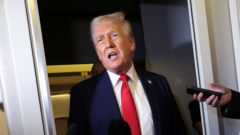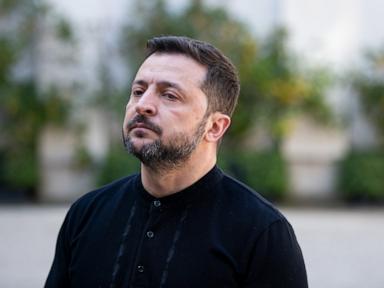President Trump is expressing increased frustration with Russian President Vladimir Putin, whose shifting demands in negotiations with Ukraine have drawn out ceasefire talks and set back Trump's hopes of a quick end to the war.
Putin’s demands on Friday for new leadership in Ukraine prompted Trump to issue a rare rebuke of the Russian leader, threatening sanctions on Russian oil exports if Moscow does not demonstrate more flexibility in talks with Kyiv.
“If I think they're tapping us along, I will not be happy about it,” Trump told reporters aboard Air Force One on Sunday, referring to Putin.
Finland’s President Alexander Stubb, who played golf with Trump on Saturday, said he suggested to the president to lay out April 20, the Easter holiday, as a deadline for Putin to agree to ceasefire terms that Kyiv has already accepted — or face costs.
“I do think that the president of the United States is a very skillful negotiator, and he's trying to find the right balance,” Stubb said in an interview with Sky News.
“My message was, he's the only one who can do it, and now we need a deadline for the ceasefire. And for me, the deadline would be the 20th of April, when he's been in office for three months, and also when we have Easter.”
Trump told NBC News on Sunday that he expects to speak with Putin this week, adding he was “pissed off” and “angry” over the Russian leader questioning Ukrainian President Volodymyr Zelensky’s legitimacy, because it moved talks in the wrong direction.
Trump and Putin last spoke by phone on March 18.
Ukraine has backed U.S. proposals for an unconditional 30-day ceasefire, and more limited proposals for a ceasefire on energy infrastructure, and a deal to limit attacks in the Black Sea.
However, Russia’s negotiators during talks in Saudi Arabia last week placed various demands on any deal, calling on the U.S. to help lift sanctions on Russian banks and promote Russian fertilizer and agriculture on the world market.
“I think Putin is a very slick communicator,” said George Barros, the Russia Team Lead at the Institute for the Study of War.
“This is sort of where Putin is strongest. And I think, when you put him in a room or phone call with Donald Trump, or have their deputies speak, the Russians are very good at sort of massaging the language and hitting the nerves and making this thing look like everything is going to be OK,” he said.
But Putin’s remarks calling for a transitional government in Ukraine set Trump off.
“He's [Putin] supposed to be making a deal with him [Zelensky], whether you like him or you don't like him. So I wasn't happy with that,” Trump said, threatening secondary tariffs on countries that import Russian oil.
Richard Haas, president emeritus of the Council on Foreign Relations and veteran diplomat, questioned the effectiveness of such a move on MSNBC’s Morning Joe Monday morning.
“That essentially means you would sanction China, India, and Turkey, the three biggest importers of Russian energy. So we'd create bilateral issues with all of them without really having a significant impact on Russia's economy,” he said.
And Trump has shown a willingness to flip-flop on tariff threats when he’s able to extract some concessions or faces major ...












